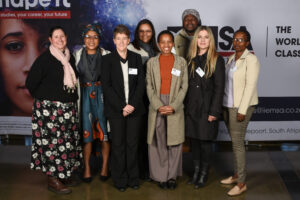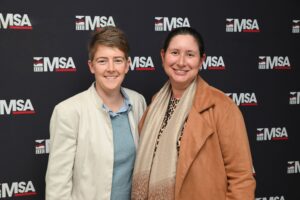It does not matter where you live on earth, you need safe, drinkable water to survive.
To sustain their lives and flourish, humans, animals, and plants need quality water to consume, clean air to breathe, bearable temperatures, and habitable environments. The importance of access and availability of safe and clean water was highlighted by various speakers at the third annual IIE MSA Water Symposium, which was hosted in Johannesburg by the IIE MSA Centre for Water and the Environment (CWE) in partnership with the Ecological Engineering Institute of Africa (EEIA). The theme for the two-day event was “Citizen Science – Uniting Science and Society for Sustainable Solutions”, a topic that Head of Environmental Science at the IIE MSA, Linda Downsborough is passionate about. “What we really need to do is capacitate people so that they are able to overcome issues. So not only do we want to encourage people to be involved but we want to and need to capacitate them to take action and to be change agents. Citizen science provides us with a very powerful tool, to do just that.”
Although taps periodically run dry in some parts of South Africa due to water supply disruptions caused by droughts, population growth, rapid urbanisation, and under-investment in infrastructure, for the most part, the quality of tap water, especially in larger metropolitan areas, is considered healthy and drinkable. However, the same cannot be said about the quality of water in our rivers, streams, and beaches, which has deteriorated due to pollution. Dr Ferrial Adam, executive manager of WaterCAN, who spoke at the IIE MSA Water Symposium, sounded a warning about the extent of water pollution in South Africa, highlighting that more than 50,000 litres of sewage flows into our rivers every second.
Dr Jim Taylor, research associate at University of KwaZulu-Natal, who delivered a keynote address at the symposium, also noted that due to pollution, there is no river today that has safe water to drink when it enters the sea.
This pollution can have numerous consequences: South Africa has first-hand experience of the dangers of poor water quality after a cholera outbreak last year led to about 30 deaths in Hammanskraal in Pretoria. The waterborne disease was caused by failure of the Rooiwal wastewater treatment works, operated by the City of Tshwane, to meet the desirable final effluent quality for discharge to the Apies River.
The health hazards posed by unsafe water makes it an imperative to test our water consistently. However, with an extensive river and stream network that extends approximately 160 000km, ensuring effective monitoring systems are in place is difficult. This is where Citizen science can come in. There is a growing realisation that Citizen science, as an approach which engages ordinary people in the collecting and analysing of scientific data, can contribute to monitoring and testing of water quality in our country. A fact which was highlighted by Dr. Khumbuzile Zuma from UNICEF who presented the keynote address on day 1 of the event: “Citizen science tools are simple, practical and scientifically proven and knowledge is generated from the ground up.”
The importance of access and availability of safe and clean water was highlighted by various speakers at the third annual IIE MSA Water Symposium, which was hosted in Johannesburg by the IIE MSA Centre for Water and the Environment (CWE) in partnership with the Ecological Engineering Institute of Africa (EEIA). The theme for the two-day event was “Citizen Science – Uniting Science and Society for Sustainable Solutions”, a topic that Head of Environmental Science at the IIE MSA, Linda Downsborough is passionate about. “What we really need to do is capacitate people so that they are able to overcome issues. So not only do we want to encourage people to be involved but we want to and need to capacitate them to take action and to be change agents. Citizen science provides us with a very powerful tool, to do just that.”
Although taps periodically run dry in some parts of South Africa due to water supply disruptions caused by droughts, population growth, rapid urbanisation, and under-investment in infrastructure, for the most part, the quality of tap water, especially in larger metropolitan areas, is considered healthy and drinkable. However, the same cannot be said about the quality of water in our rivers, streams, and beaches, which has deteriorated due to pollution. Dr Ferrial Adam, executive manager of WaterCAN, who spoke at the IIE MSA Water Symposium, sounded a warning about the extent of water pollution in South Africa, highlighting that more than 50,000 litres of sewage flows into our rivers every second.
Dr Jim Taylor, research associate at University of KwaZulu-Natal, who delivered a keynote address at the symposium, also noted that due to pollution, there is no river today that has safe water to drink when it enters the sea.
This pollution can have numerous consequences: South Africa has first-hand experience of the dangers of poor water quality after a cholera outbreak last year led to about 30 deaths in Hammanskraal in Pretoria. The waterborne disease was caused by failure of the Rooiwal wastewater treatment works, operated by the City of Tshwane, to meet the desirable final effluent quality for discharge to the Apies River.
The health hazards posed by unsafe water makes it an imperative to test our water consistently. However, with an extensive river and stream network that extends approximately 160 000km, ensuring effective monitoring systems are in place is difficult. This is where Citizen science can come in. There is a growing realisation that Citizen science, as an approach which engages ordinary people in the collecting and analysing of scientific data, can contribute to monitoring and testing of water quality in our country. A fact which was highlighted by Dr. Khumbuzile Zuma from UNICEF who presented the keynote address on day 1 of the event: “Citizen science tools are simple, practical and scientifically proven and knowledge is generated from the ground up.”Dr Jim Taylor also highlighted South Africa’s role in the Citizen Science movement, especially in regard to meeting the requirements of the Sustainable Development Goals (SDGs), especially that of SDG 6. “South Africa has taken the lead in developing water quality monitoring tools like Clarity Tube and MiniSASS, which are inexpensive and easy-to-use – in fact the United Nations report on progress on ambient water quality highlighted miniSASS as having global potential.” These tools were also instrumental in bringing about change in Mphophomeni township near Midmar Dam in KwaZulu-Natal.
Communities recognise the importance of working with professional scientists and researchers to monitor and test water quality. In 2022, WaterCAN worked with 77 community volunteers who conducted 100 tests – this number grew more than 10-fold with the number of volunteers increasing to 866 in 2023, resulting in 1,500 tests being carried out. The South African National Biodiversity Institute (SANBI) in partnership with Nature Speaks and Responds NPC, is also currently working with traditional health practitioners on citizen science aquatic monitoring and a Water Research Commission (WRC) funded Citizen Science State of the Rivers Reporting project is also underway. Due to the deterioration of water quality, organisations like WaterCAN and many others are being galvanised into action to collaborate with communities to monitor and test the quality of water across the country. The Citizen Science Association of Southern Africa (CSA) is being developed. Its current co-chairs, Dr Pearl Gola from the South African National Biodiversity Institute and Noloyiso Mbiza from the Department of Water and Sanitation also attended the IIE MSA Water Symposium. “There really seems to be a lot of things going on in the citizen science space, both locally, nationally and globally and the interest in the IIE MSA Water Symposium is a signal of this – and one of the things we really wanted to do was to provide a platform to bring people together to talk about citizen science”, said Linda Downsborough. The Centre for Water and the Environment at IIE MSA also partnered with ADvTECH’s Environmental Social Governance (ESG) unit and ran a school’s competition for primary and high school students around the country and Africa. “We were taken aback by the caliber of entries we received”, says Linda Downsborough, “and it highlighted just how important citizen science is. We need to democratize science and bring water and the environment into our classrooms.” Linda Downsborough mentioned that she was very impressed with the experience and passion of the attendees and speakers at the event and reiterated the importance of Water Studies in addressing the country’s water challenges. Downsborough added that IIE MSA is one of South Africa’s leading educational campuses, offering an array of programmes including a specific focus on water management. The IIE Postgraduate Diploma in Water Management (PGDip in Water Management) and IIE Master of Philosophy in Integrated Water Management will enable professionals to understand complex water challenges and to develop interdisciplinary and practical solutions to water and sanitation problems. IIE MSA is an educational brand of The Independent Institute of Education (The IIE), the leading private higher education provider who is registered with the Department of Higher Education and Training. https://www.iiemsa.co.za/




